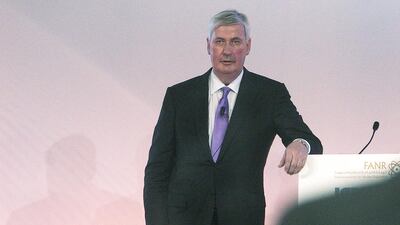ABU DHABI // Levels of radiation produced naturally by materials used in the oil and gas industry may soon be regulated by the nuclear watchdog.
“Oil and gas production generally creates an exposure situation,” said John Loy from the Federal Authority for Nuclear Regulation at the second International Symposium on the System of Radiological Protection, held in Abu Dhabi yesterday.
“Radioactive material is brought into a situation where exposure arises and oil and gas production workers are like aircrew – their work for an entirely non-radiation using purpose brings them into a situation of exposure to higher levels of naturally occurring radiation.”
He said both industries had a strong safety culture, but they differed in that the exposure of oil and gas to naturally occurring radioactive materials, known as Norm, varied more widely.
“The exposure from an Abu Dhabi to Sydney flight can be assessed by algorithm while oil and gasfields differ widely and the activities of workers are more varied. But measurements of activity concentrations and generic behaviour modelling can allow exposures on average to be assessed in oil and gas.
“When Adnoc [Abu Dhabi National Oil Company] takes its pipes somewhere to clean them to get rid of Norm residues and dispose of them, that all needs to be regulated.
“We don’t cover oil and gas production at the moment. We could, but I think we need to set up a system whereby we say, ‘It’s worth it if the exposure is above a specific level and it’s not worth it if it’s below’.
“The trick is to set that level right, something that’s sensible and appropriate, and that’s something we have to talk to the industry about.”
Although some oil and gas companies have no activity to do with radioactive materials, the authority would have to estimate the doses some workers receive, Mr Loy said.
“If they don’t seem to be very significant, then they can rely on normal occupational health and safety rules.”
But others would have to face extensive regulations, including authorisation, licensing, assessment against requirements and regulations, inspections and enforcement.
In the European Union, the benchmark is about six millisieverts a year. “The natural background is about two to three,” Mr Loy said. “Using that as a benchmark is one option and it’s done for aircrew but whether it is appropriate for oil and gas is something we have to discuss.”
The authority will consult relevant parties over the next 12 to 18 months before making a decision on a reference level and a methodology for dose assessment.
In the meantime, it is assessing its first application by Adnoc for a Norm facility. “We’re expecting to make a decision on that by the end of the year,” Mr Loy said.
Other nuclear bodies are also working on safety.
“We’re developing a future report about different kinds of exposure situations to complete by 2015,” said Jean-Francois Lecomte of the French nuclear watchdog, the Institute for Radiological Protection and Nuclear Safety.
“There have been some changes in radiation protection in terms of classification of situation. Before, practice was strong but intervention was relaxed. Now, we consider that any exposure situation should be managed through more or less the same way.”
He described the Fukushima nuclear power plant accident in Japan as "a full mess".
“The system was not totally understood and it was not applied in a good way,” he said. “It’s useful to produce a report explaining how the system works in these cases and we consider there is a particular need because these exposure situations are very diverse so we want to have a global figure for all situations.”
cmalek@thenational.ae

